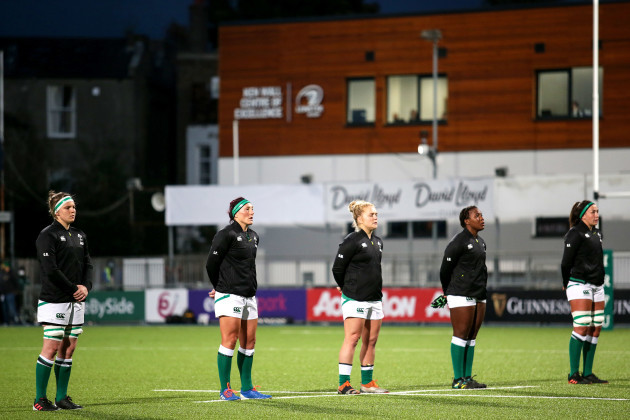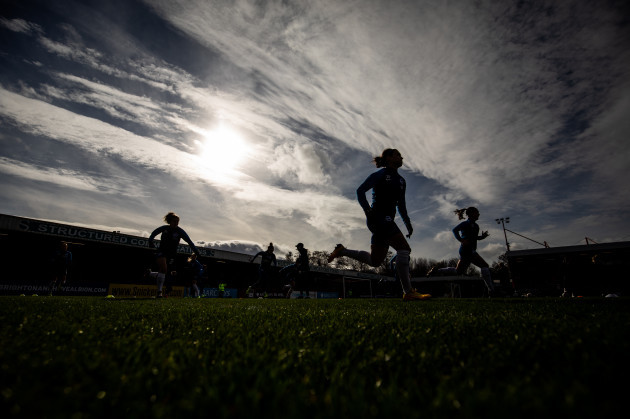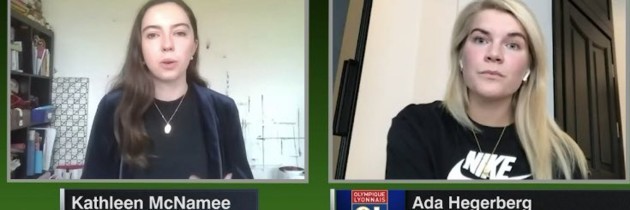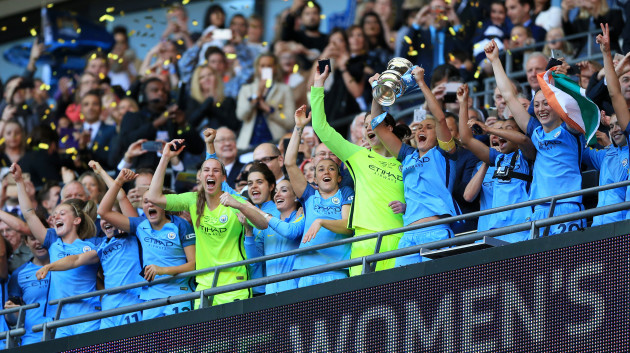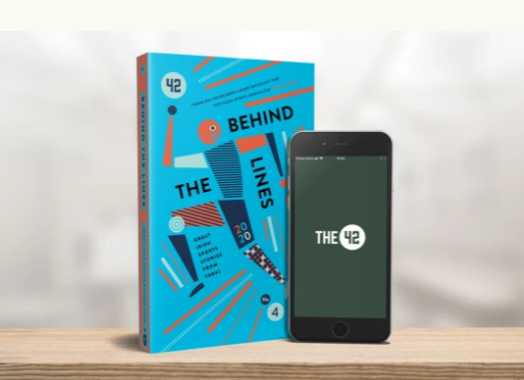THREE DAYS INTO February, the word finally arrived, even though it had been promised much earlier.
Full details of the rescheduled 2021 Women’s Six Nations were to be announced “by the end of January”, as per a statement released on the 13th of that month.
But the wait went on for the Irish team and others, who, of course, continued to train with nothing set in stone, having gone through enough uncertainty over the last while.
With the build-up for Andy Farrell’s men’s opener against Wales in full swing, news finally filtered through of new dates and a condensed tournament in April.
“Great to see fixtures set in stone and an actual end goal in sight for players,” Irish legend Niamh Briggs tweeted at the time, though uncertainty still reigns over the World Cup qualifiers, with the finals tournament taking place in New Zealand in September.
The Six Nations was one of several high-profile women’s sport events — sport is sport, but the qualifier is needed in this article to differentiate — impacted in January as the Covid-19 crisis continued.
A small snapshot of the state of play in women’s sport at the time, as noted by ESPN’s Kathleen McNamee, read:
- FA Cup suspended – no return date
- Six Nations postponed – no return date
- RWC qualifiers postponed – no return date
- No start date for Ladies European Tour
And that’s just the tip of the iceberg. There has been mass postponement of major female sporting events over the past few months, while most male tournaments continue.
As the men’s FA Cup was in full flow across the water, a coin toss and the drawing of lots were among the options being considered to decide matches in the women’s competition, which was postponed due to its non-elite classification.
124 men’s teams take part in the FA Cup from the third round on: 20 Premier League sides, 72 in total from the Championship, League One and League Two, plus the 32 surviving teams out of 644 in the lower tiers.
In all, 158 men’s teams — including all of the above, along with the National League, National League North and National League South — are considered elite, while just 23 women’s sides are, across the Women’s Super League and the Championship.
While the Women’s FA Cup, albeit a lot further along, was impacted last year, the final took place in the autumn. Could it not continue this time around, like the men’s competition?
Despite the massive backlash over the past few weeks, the coin toss and drawing of lots are still possibilities, though the FA will review the situation as restrictions loosen.
That said, the prospect of the lower-tier [3-6] seasons being declared null and void is becoming increasingly likely, while the Scottish Women’s Premiership, which was due to start two weekends ago, remains at a standstill.
While the Covid situation varies across Europe and around the world, most other women’s football leagues are ongoing.
On these shores, Women’s National League [WNL] fixtures have been announced and it’s set to kick off on Saturday, 27 March, while it’s understood that Vera Pauw’s Ireland team will utilise the next international window for friendlies, having missed this one.
In terms of where Irish internationals play their club football, the US National Women’s Soccer League [NWSL] recently announced its schedule, while Germany’s Frauen-Bundesliga, Italy’s Serie A and France’s Feminine Division 1 all continue, with the exception of unavoidable Covid-19 match cancellations.
The Australian Women’s Football League [AFLW] is underway too, although it has been impacted by snap lockdowns. There’s Irish links to that, of course, with 14 involved in the 2021 season.
Most of those will return to these shores to play inter-county football, though that also remains up in the air, just like their male GAA and camogie counterparts.
On an international scale again, there is no start date in place for the Ladies European Tour, with a lot of the initial events pencilled in for France and South Africa. While golfers suffer, tennis players have availed of extra events and small tournaments put on by the Women’s Tennis Association [WTA] to keep them ticking over.
Back to team sports, and coming full circle: while we now have a clearer picture of the Six Nations, it’s a World Cup year and we don’t know if Ireland are going to be there, with no further word on the Rugby Europe qualifiers which were postponed in December.
Or if the World Cup will even go ahead. Yes, similar uncertainty surrounds the Olympics, but at least it’s being discussed. The never-ending speculation can be damaging to those directly involved, but at least it is being talked about. There is little to nothing about the World Cup. Just imagine for one minute if it was the men’s equivalent.
Ultimately, the big question is why is women’s sport being hit so much harder by Covid? Postponing major events and tournaments is surely not good enough at this stage.
“That’s the thing that I keep coming back to with the cancellation of women’s sport, we did have an entire year of events being cancelled and postponed,” McNamee nods, in conversation with The42.
“I think most people at the time were pretty happy to say, ‘That’s fair enough, we’re going through something that’s totally unprecedented. We don’t know how to go forward, and it’s probably safer to just take the year.’
“But at the same time, you would think that those same organisers would be thinking in their head last year, ‘Well, worst case scenario for next year is we’re still going through Covid. Best case scenario is we can have games going ahead, and we can have fans.’
“For me, the main issue with all of this is it’s not only organisers failing to appreciate that, and set things in motion quicker. It’s also just an exacerbation of all the problems that were there before we even had a pandemic.”
That is the bottom line: this has really shown up the structural inequalities and other disparities that exist.
Where does responsibility for why women’s sport is being hit harder lie? The questions are endless, and difficult to answer, but worth thinking about.
Is it that governments are not doing enough to make sure that they could continue? Is it the sports’ governing bodies and national organisations were not being properly organised and prepared? Or that TV and sponsors are not valuing the sport and product properly and not putting enough pressure on for it to continue — would they let the Olympics be postponed again without a fight?
What about the legacy of years and years of inequity, and the impact that’s had on women’s sport?
It appears to be a mixture of everything, the last point particularly evident through that disparity in ‘elite’ teams across men’s and women’s football in England, and the challenges the Six Nations faced due to the part-time status of women’s teams as professional men’s sides bubbled and the competition commenced as normal.
“We say it so much, money needs to go into women’s sport for it to be better and for it to become the elite level that I think most people who watch it and play in it know that it can be,” McNamee continues.
“When you see something like the FA postponing the FA Cup because the teams that are competing at the moment are non-elite, and then you see that there’s all these men’s teams classified as elite, and not even a fifth of them in the women’s game are, it doesn’t really make any sense.
“If you’re thinking we’re coming so far in equality, it doesn’t make sense that those very structural things still exist. That’s not going to change this year — if anything, it’s more concerning because so many federations and sports organisations are losing a lot of money.
“Are there going to be the resources later down the line to put into these sports to make sure if, God forbid, something like this ever does happen again, women’s sport is actually in a better place to deal with this?”
While the Premier League resumed last year, the remainder of the 2019/20 WSL was cancelled and Chelsea were crowned champions on a points-per-game basis. The WSL is considered a professional league and the 2020/21 season has thankfully gone ahead, but look at the Frauen-Bundesliga in Germany. It’s not fully professional, but it was the only women’s league in Europe to restart during the first wave after receiving financial aid from the German Football League (DFL) to allow the necessary testing to take place.
That commitment needs to be seen elsewhere.
“There are options,” McNamee nods, pointing to that solidarity package.
“But it just requires a level of knowledge and finance that I don’t know entirely exists across the board in women’s sport just yet. And then in the places where it should exist, we’re just not seeing the fruits of it, which is disappointing.”
“We are doing a lot better than we used to be,” she stresses, “and so much of what is wrong comes down to the you know who is running it, what organisation is ploughing money into it.
“There’s such a massive argument about whether these things should be separate to men’s teams or organisations, or whether they should be run alongside them. In some ways, I think it’s almost a moot point. It’s so dependent on who is on the other side.”
Look at the incredible structures in place at Manchester City Women, for example, and the powerhouse they have become — McNamee sees that closely through her work with ESPN — while Liverpool’s equivalent struggle.
In a more general point, she and this writer agree that if you support a club, you should support every team involved from the underage sides to the women. Take, for example, City, Liverpool or Manchester United in both the Premier League and WSL.
It’s completely fair that most people prefer men’s sport, but we must be aware of the unconscious bias, which is hopefully shifting with the help of the media, the 20×20 campaign and much more.
After all, sport is sport, and women’s sport — again, to differentiate — must be appreciated on its own merits. It must, at least, be given a chance.
“Sportspeople love sport, they love to win, and they love their side winning. I don’t think it’s as hard to get people on board as some people seem to think it is. Obviously you have the, ‘I don’t care’ brigade, but you’re probably never gonna change their minds anyway.”
The more support behind the cause and voices that are heard, the better. And the big question — why is women’s sport being hit so much harder by the Covid-19 pandemic? — needs to be asked more and more over the coming weeks and months. A lot of it comes back to money and revenue streams, and if men’s tournaments are going ahead, a way must be found for women’s ones.
“This is their job, a lot of people.” McNamee notes. “Even if they’re semi-pro, they’re still getting money for going out and playing and training and going to tournaments. For other people, they are fully professional and this is the only thing they do.
“If you’re a tennis player or a golf player and you depend on a circuit going ahead for your sponsorship deal, for whatever agreements you have with certain companies, this is a massive financial hit for you as well. We talk a lot about the finances that have to go into making these events happen, but also forget that what people get out of them.”
“There is a market out there for women’s sport, and I think brands are discovering it more and more,” she concludes.
“More and more, big brands are seeing the benefit in this, and I think the curve of the sport has only been going up for the last while.
“For me it is only going in one direction. This might plateau it for a while but I can’t see it lasting forever, because there’s too many people who do see it now as a financial benefit.”
